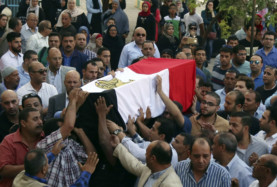
It is wrong to think that the terrorists who perpetrated the attack in Egypt are just a group of outlaws who can easily be hunted down, noted Egypt’s Al Ahram. “Egyptians have to realise a few facts in order to achieve victory in this war. These terrorists are being trained in camps, supported with arms and money and are politically backed by foreign bodies. The goal of these organisations is not just to target a number of soldiers, their goal is to harm the entirety of Egypt’s people and institutions, and its unity and stability. The frequency and sequence of these cowardly attacks during the past few weeks prove that the terrorists are embroiled in their final battle. It is like a venomous snake that becomes more vicious once it is backed into a corner.”
The incident of terrorism in Egypt reaffirms the machinations of terrorist organisations to harm Egypt as a state and institution, said UAE’s Al Khaleej. “The aim of these attacks was to undermine the country’s security and stability, complementing the malignant role of these groups in Iraq, Syria and other Arab states to weaken Egypt’s institutions, particularly the country’s Armed Forces and police. Egypt is being targeted because it is strong, plays a prominent regional role and is a key Arab state, and because it refused to attack and destroy other Arab armies. Egypt is being targeted because its national unity remains unshaken despite all the failed attempts to undermine and disparage said unity. What happened in Al Wahat is a warning siren for Egypt that terrorism can infiltrate and attack anywhere, which calls for more vigilance and field surveillance from all security bodies and citizens.”
Netanyahu appears to have an insatiable appetite for Palestinian lands; now the Jordan Valley is in his sights, and he vowed that it ‘will always remain a part of Israel’, wrote the Jordan Times.
“Speaking on October 19 at a ceremony marking 50 years since Israel settled the area, the Israeli prime minister said of the Jordan Valley: “We will continue to settle it, invest in infrastructure and tourism.” Not even an attempt at disguising the occupation! Netanyahu surely knows that occupation is in violation of international law and of the peace treaty Israel signed with Jordan. The Israeli leader, true to character, makes no bones about expressing his country’s colonialism, but international law is clear: The Jordan Valley is Occupied Territory and Israel has no business making plans for it, neither for defence nor for more peaceful purposes.”
Iran’s flagrant interferences in the affairs of countries in the region have led to prolonging sectarian conflict in Iraq, wrote Saudi Arabia’s Al Yaum. “The harmony in the Saudi and American vision to face Iran’s regional threat is an obsession for both nations that is based on the fact that Iran is the key factor for shaking up the security and stability of countries in the region. In light of current circumstances, it is imperative that the European Union joins and supports the mechanism for punishments that should be imposed on the Iranian regime, not just because this regime is the top supporter of terrorism around the world, but also because it poses a threat to international security and peace ...”




_resources1_16a31069e4e_small.jpg)







